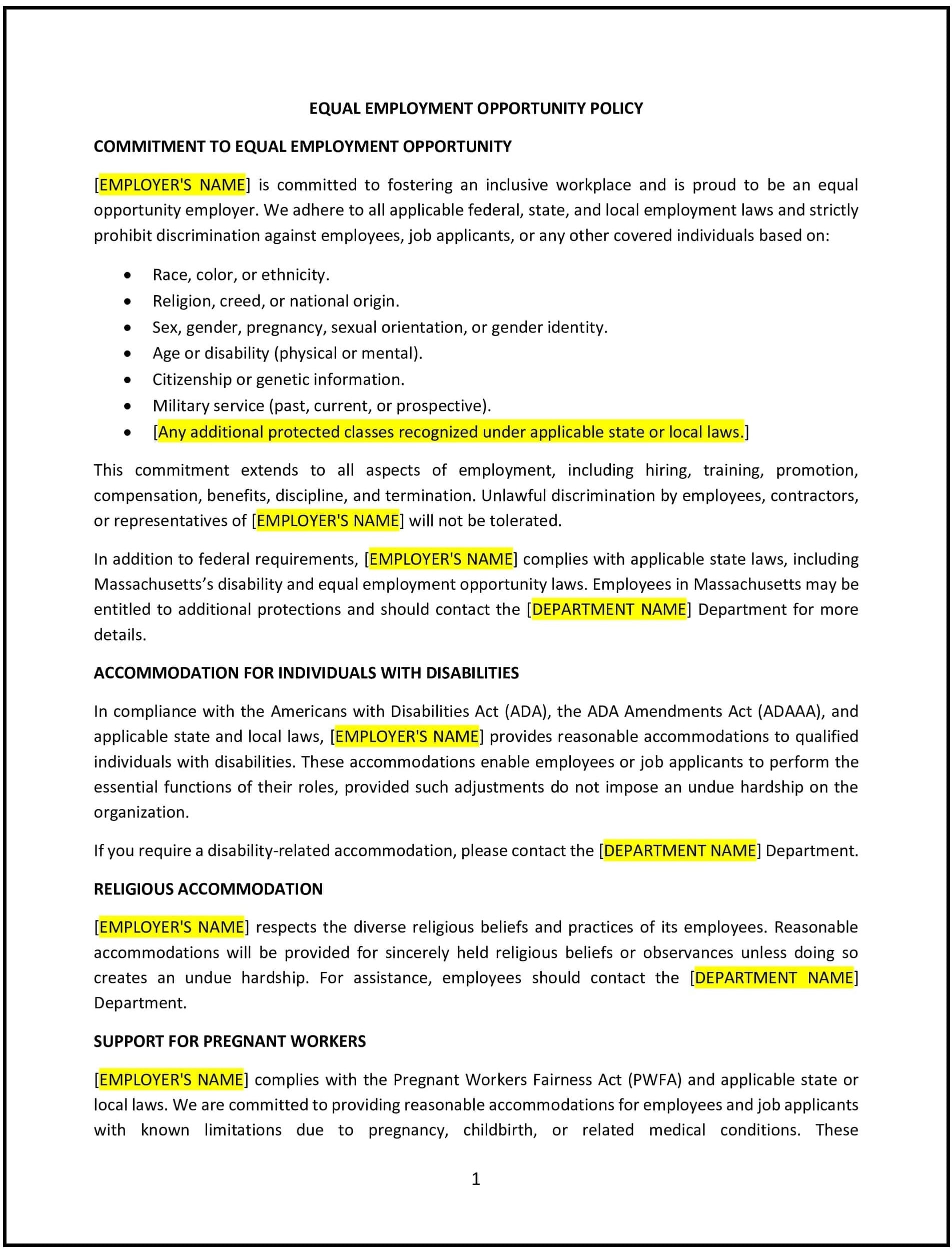Equal employment opportunity policy (Massachusetts): Free template
Got contracts to review? While you're here for policies, let Cobrief make contract review effortless—start your free review now.

Customize this template for free
This equal employment opportunity (EEO) policy is designed to help Massachusetts businesses create a fair, inclusive, and non-discriminatory work environment. The policy outlines the company’s commitment to providing equal employment opportunities to all employees and applicants, regardless of race, color, religion, gender, gender identity, sexual orientation, age, disability, national origin, marital status, military service, or any other characteristic protected by Massachusetts state laws and federal regulations. The policy emphasizes the company’s dedication to preventing discrimination and promoting diversity at all levels of employment.
By adopting this policy, businesses can foster an inclusive and equitable workplace, strengthen compliance with anti-discrimination laws, and build a reputation as an employer of choice.
How to use this equal employment opportunity policy (Massachusetts)
- Define protected characteristics: Clearly outline the characteristics that are protected under the policy, including race, gender, age, sexual orientation, disability, religion, and any other category defined under Massachusetts state laws and federal anti-discrimination laws, such as Title VII of the Civil Rights Act of 1964.
- Promote diversity in recruitment: Encourage diversity in recruitment efforts by ensuring that hiring practices do not discriminate against any group of individuals. This includes advertising job openings in a way that reaches diverse candidate pools, conducting unbiased interviews, and assessing candidates based on their qualifications rather than personal characteristics.
- Set guidelines for fair treatment: Specify that all employees will be treated fairly in all aspects of employment, including hiring, promotion, compensation, benefits, training, and termination. The policy should ensure that decisions are made based on merit and qualifications, not biased or discriminatory factors.
- Address workplace accommodations: Outline the company’s commitment to providing reasonable accommodations for employees with disabilities and those with specific religious needs, ensuring that they can fully participate in the workplace.
- Establish a process for reporting discrimination: Provide a clear, confidential process for employees to report discrimination, harassment, or any concerns related to equal employment opportunities. The policy should specify that reports will be investigated promptly and handled in a non-retaliatory manner.
- Ensure compliance with Massachusetts and federal laws: Ensure that the policy complies with Massachusetts state laws, such as the Massachusetts Fair Employment Practices Law, and federal laws, including Title VII of the Civil Rights Act of 1964, the Americans with Disabilities Act (ADA), and the Age Discrimination in Employment Act (ADEA).
- Review and update regularly: Periodically review and update the policy to ensure it reflects current legal requirements, best practices, and the company’s ongoing commitment to diversity, equity, and inclusion.
Benefits of using this equal employment opportunity policy (Massachusetts)
This policy offers several benefits for Massachusetts businesses:
- Promotes fairness and equality: By ensuring that all employees are treated fairly and equitably, businesses create a positive work environment where everyone has the opportunity to succeed based on their qualifications and performance.
- Enhances recruitment and retention: A commitment to equal employment opportunities helps businesses attract a diverse pool of talent and retain employees who value a non-discriminatory and inclusive workplace.
- Reduces legal risks: The policy helps businesses comply with Massachusetts state laws and federal anti-discrimination laws, reducing the risk of discrimination lawsuits, fines, and penalties.
- Improves company reputation: A company that is committed to equal employment opportunities enhances its reputation as a socially responsible employer, which can improve its standing in the community and attract top talent.
- Increases employee morale: Employees who feel they are treated fairly and equally are more likely to be engaged, satisfied with their job, and motivated to perform at their best.
- Fosters a diverse workplace: Promoting equal opportunities for all employees fosters a diverse and inclusive workplace that benefits from varied perspectives, which can enhance creativity, problem-solving, and innovation.
Tips for using this equal employment opportunity policy (Massachusetts)
- Communicate the policy clearly: Ensure that all employees are aware of the company’s equal employment opportunity policy and understand their rights and responsibilities. This can be done through employee handbooks, training sessions, and regular internal communications.
- Provide training to employees and management: Offer training for employees and managers on the importance of equal employment opportunities, how to avoid unconscious bias, and how to create an inclusive work environment.
- Monitor and evaluate hiring practices: Regularly assess the company’s hiring, promotion, and compensation practices to ensure they align with the EEO policy and that all employees are evaluated based on their qualifications and performance.
- Address complaints promptly: Ensure that all complaints of discrimination or harassment are addressed promptly, confidentially, and in a non-retaliatory manner. This may involve an investigation by HR or an external third party.
- Implement a diversity and inclusion strategy: Develop and implement a broader diversity and inclusion strategy that complements the EEO policy. This can include initiatives to support underrepresented groups, mentorship programs, and employee resource groups.
- Review and update regularly: Periodically review and update the policy to ensure it is compliant with Massachusetts state laws, federal regulations, and the company’s evolving diversity and inclusion goals.